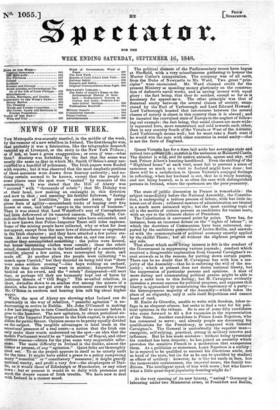*NEWS OF THE WEEK.
Tun Metropolis was scarcely startled, in the middle of the week, by the rumour of a new rebellion in Ireland. The first thought was, that probably it was a fabrication, like the telegraphic despatch vamped up at Liverpool, or the story in the New York Tribune ; or if not, at least a gross exaggeration ; or even if true—what then! Anxiety was forbidden by the fact that the scene was nearly the same as that in which Mr. Smith O'Brien's army suc- cumbed to a handful of policemen. The Irish papers were flooded with reports; but it was observed that the most emphatic portions of these accounts were drawn from hearsay authority ; and no- thing certain seemed to be known, except that the people in some places near the spot were "excited" by rumours of the commotion. It was stated that the Hill of Aheny was " covered " with "thousands of rebels " ; that Mr. Doheny was at their head, now making an onslaught in this direction and now in that ; and amusing his faithful followers, "during the cessation of hostilities," like another Antar, by prodi- gious feats of agility—mountebank tricks of leaping over five horses at once, and other "essays in the intervals of business." Then it was stated that Lord Waterford's seat of Curraghmore had been deflowered of its vaunted cannon. Finally, that Car- rick-on-Suir had been taken ! Soberer tales have succeeded, and it is now known that Police-Inspector Trant still rides supreme. Some of the mining people have collected, why or what for does not appear, except from the mere love of disturbance so engrained in the Irish character ; and they have attacked a few police sta- tions. At one they marched up, were shot at, and ran away. At another they accomplished something : the police were housed, but boxes containing clothes were outside ; these the rebels seized, dressed themselves in the brief authority of a constabulary exterior, played a few antics, were interrupted by shots, and made of. At another place the people were collecting "to march upon Carrick," but they desisted on being told that "there were some soldiers coming "—like boys robbing an orchard. By this time the military were in motion; Inspector Trant buckled on his sword, and the "rebels" disappeared—till next time, or perhaps till they are humanely kept out of harm by judicious threats of " Old Bogy." The so-called rebellion, in short, dwindles down to an aimless riot among the miners of a district, who have not got over the excitement caused by seeing Mr. O'Brien in uniform and hearing him talk big about higher Wages.
While the men of Aheny are showing what Ireland can do practically in the way of rebellion, "peaceful agitation" is en- deavouring to revive in Dublin. Mr. John O'Connell is making a few last struggles to turn Conciliation Hall to account before it goes to the hammer. The new agitation, to obtain periodical sit- tings of the Imperial Parliament in the Irish capital, is also a can- didate for public favour. Opinion seems to be pretty equally divided on the subject. The tangible advantages to local trade in the occasional presence of a real court—a notion that the Irish can only make their wants understood on the spot—an idea that the mobile Parliament would be an "instalment" of Repeal, and other obvious reasons—obtain for the plan some very respectable adhe- sions. The main difficulty in Ireland is the dislike, almost the horror at present, of any "agitation." Quiet folks are thoroughly tired out. To us the project appears in itself to be utterly unfit for the time. It might have added a grace to a policy comprising many "remedial" or "conciliatory " measures; it might gratify national vanity, and profit a very few—the shopkeepers of Dub- lin, as it would those of Edinburgh or Manchester, or any other town : but at present it would be to daily with pretences and mock the deeper causes of Irish trouble. We have now to deal with Ireland in a sterner mood.


























